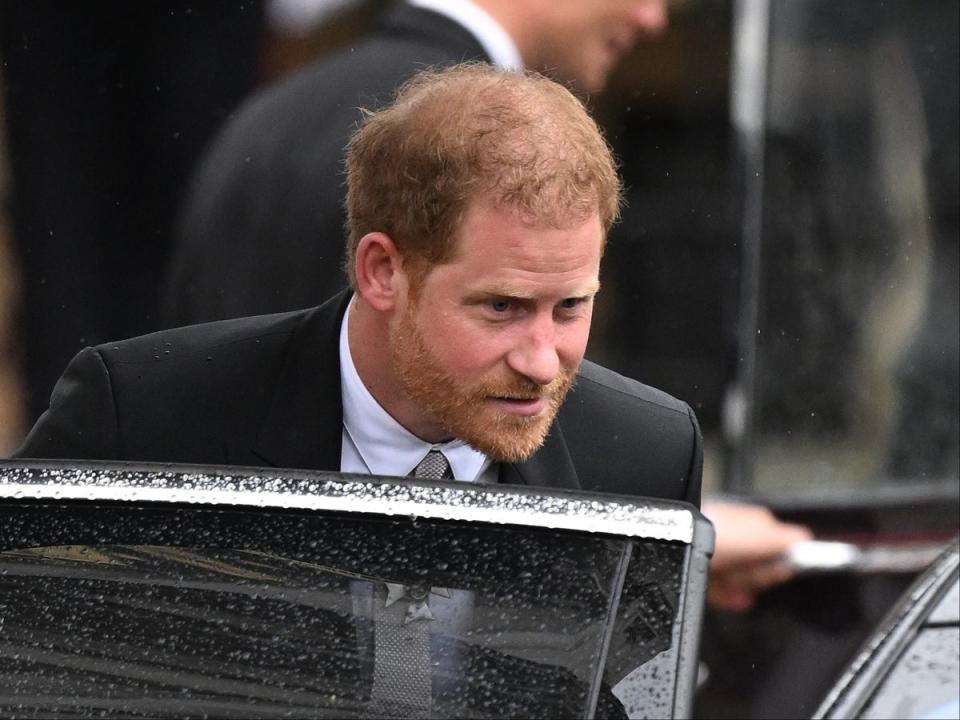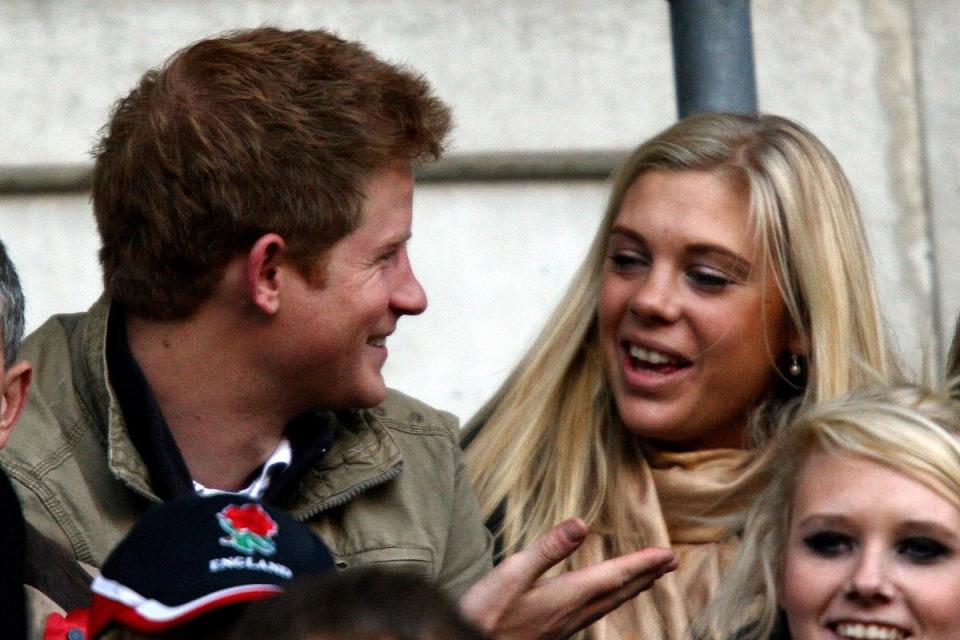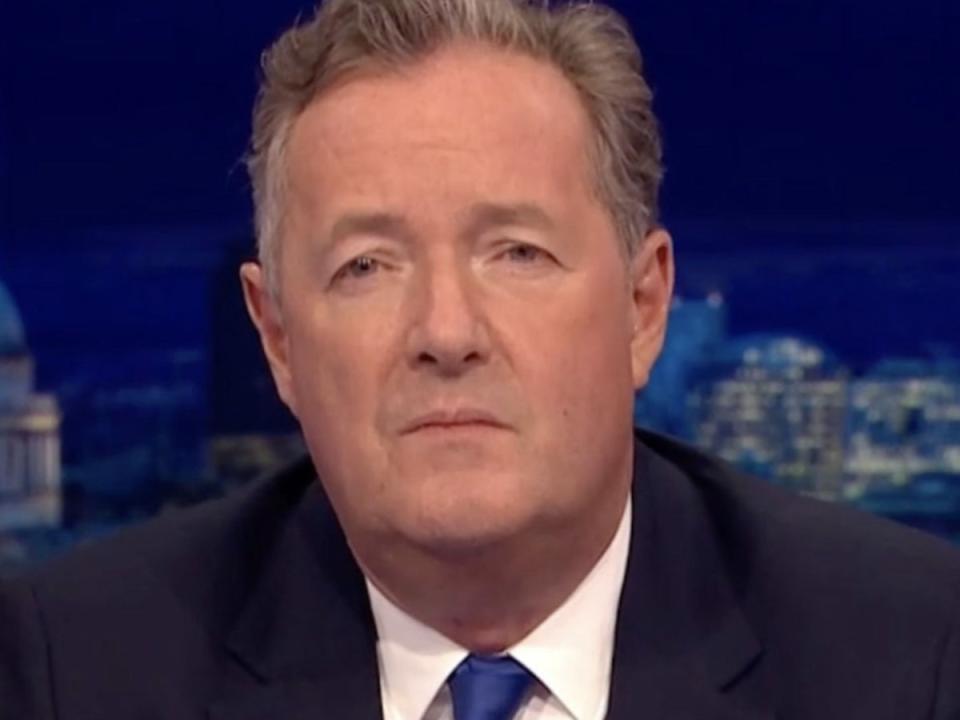Mirror publisher admits unlawfully gathering information on Prince Harry as phone-hacking trial begins
- Oops!Something went wrong.Please try again later.
- Oops!Something went wrong.Please try again later.
The publisher of the Daily Mirror newspaper has apologised “unreservedly” to Prince Harry for unlawfully gathering information about him, the High Court has been told.
Several high-profile figures, including Harry, are bringing damages claims against Mirror Group Newspapers (MGN) over alleged unlawful information gathering at its titles.
The court has been told the “systemic” use of private investigators by journalists to unlawfully obtain private information was authorised by senior editors including Piers Morgan.
Mirror Group Newspapers (MGN) said in court documents that the Duke of Sussex was entitled to “appropriate compensation” after accepting it carried out one instance of unlawfully gathering information.
The statement forms part of the publisher’s defence to claims brought by Harry and other individuals over alleged unlawful information gathering at MGN titles - which also include Sunday Mirror and Sunday People.
As well as Prince Harry, Coronation Street actors Nikki Sanderson and Michael Turner and comedian Paul Whitehouse’s ex-wife Fiona Wightman are all expected to give evidence during the six to seven-week trial.
Andrew Green KC, representing the publisher, said voicemail interception was denied in the cases being examined in the trial, including that of the duke. The barrister also said some of the challenges it faces have been brought beyond a legal time limit.
Mr Green added: “There is some evidence of the instruction of third parties to engage in other types of unlawful information gathering in respect of each of the claimants, save for Mr Turner whose claim is entirely denied, and MGN has made pleaded admissions in respect thereof.
“MGN unreservedly apologises for all such instances of unlawful information gathering, and assures the claimants that such conduct will never be repeated.”
The barrister said that it was admitted that a private investigator was instructed, by an MGN journalist at The People, to unlawfully gather information about the duke’s activities at the Chinawhite nightclub one night in February 2004.
Mr Green said there was a reference to a payment record for £75 in February 2004.
He continued: “It is admitted that this represented an instruction to engage in unlawful information gathering, and MGN unreservedly apologises and accepts that the Duke of Sussex is entitled to appropriate compensation for it.
“MGN does not know what information this related to, although it clearly had some connection with his conduct at the nightclub.”
The barrister said that there was a People article published in February 2004 “giving the recollection of a woman Harry spent time with” at the club.
Mr Green added: “The Duke of Sussex notably does not claim in relation to this article, so it is not alleged that this instruction led to the publication of his private information. The fee paid, £75, suggests little work was involved.”

Chelsy Davy, the former girlfriend of the Duke of Sussex, decided that “a royal life was not for her” as a result of alleged unlawful information gathering by journalists at MGN.
In court documents, David Sherborne, representing Harry in his damages claim against the publisher, said these activities, including the alleged unauthorised accessing of his voicemails, caused the duke "huge distress" and created "a huge amount of paranoia in my relationships".
Referencing Harry’s witness statement in the case, Mr Sherborne said: "He became immediately suspicious of anyone named in stories about him and felt that he could not trust anybody, even at such a young age. It also caused great challenges in his relationship with his ex-girlfriend Chelsy Davy, and made him fear for his and her safety.
"Ultimately, MGN’s activities led Ms Davy to make the decision that ‘a royal life was not for her’, which was ‘incredibly upsetting’ for the Duke of Sussex at the time. They also caused their circle of friends to become smaller and smaller, meaning that friendships were lost entirely unnecessarily, and led to ‘huge bouts of depression and paranoia’."
Mr Green said voicemail interception was denied in all four cases and that there was “no evidence or no sufficient evidence”.

At the start of the hearing in London, barrister David Sherborne, for the duke and other people bringing claims, said that the case featured unlawful activities on an “industrial scale carried out across three newspapers over a period of about 20 years or so”.
Addressing Harry’s case, Mr Sherborne said his claim covered the period 1995 to 2011 and is “significant not just in terms of the span but also the range of activities”.
The barrister said that in 1995, “the royal family had become big news for the tabloid newspapers” with interest continuing throughout the now-King Charles’ divorce from his then-wife Diana, Princess of Wales, and her “untimely death” in 1997.
Mr Sherborne told the court: “We all remember the images of him walking behind his mother’s coffin.
“From that moment on, as a schoolboy and from his career in the army and as a young adult he was subjected, it was clear, to the most intrusive methods of obtaining his personal information.”
An MGN spokesman said: “Where historical wrongdoing has taken place we have made admissions, take full responsibility and apologise unreservedly, but we will vigorously defend against allegations of wrongdoing where our journalists acted lawfully.
“MGN is now part of a very different company. We are committed to acting with integrity and our objective in this trial is to allow both the business and our journalists to move forward from events that took place many years ago.”
The case potentially puts Harry on a collision course with Piers Morgan, the TV presenter and former editor of the News of the World and The Mirror.

In a separate case against the publishers of the now defunct News of the World, Harry claimed in court documents submitted to the High Court last month that Mr Morgan “knew about, encouraged and concealed” illegal targeting of his late mother Diana, Princess of Wales, when he was editor of the paper.
News Group Newspapers denies the allegations.
Mr Morgan, now presenter of the Piers Morgan Uncensored show on Talk TV, has always denied any direct knowledge of phone-hacking during his time as a tabloid newspaper editor.
The presenter was forced to resign as presenter of Good Morning Britain in March 2021 after telling viewers that he “didn’t believe a word” of what the Duchess of Sussex told Oprah Winfrey in an interview about her time with the royal family. He has often criticised the couple on social media and in newspaper columns.
The case against MGN is just one of several Prince Harry is involved in. He has also brought legal action against other newspaper publishers, a news and picture agency and the Home Office.
Additional reporting by Press Association.

